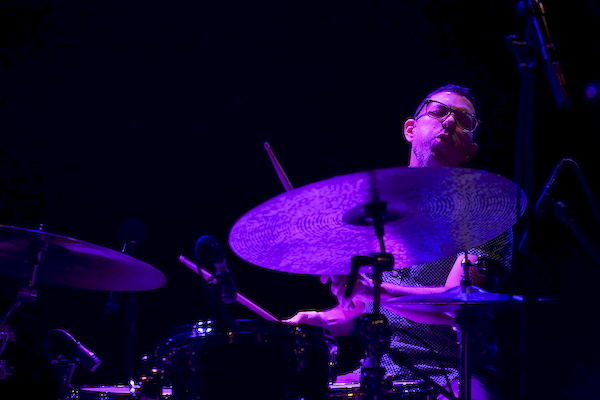Jan 13, 2026 2:09 PM
More Trump-Kennedy Center Cancellations
The fallout from the renaming of the John F. Kennedy Center for the Performing Arts to include President Donald…

Mark Guiliana performs during Winter Jazzfest, which ran at various venues in Manhattan and Brooklyn between Jan. 8 and 18.
(Photo: Jonathan Chimene)Winter JazzFest’s already tremendous musical scope has been widening in recent years to include crucial ideas and concepts from within the jazz community. Social justice has been an ongoing concern, with festival-sponsored panels addressing questions of race, gender and immigration. And for WJF’s 2020 iteration, which ran Jan. 8–18 in various New York jazz venues, it added a major new component: physical and mental wellness.
“This conversation needs to normalize talking about mental health, talking about wellness,” said Jennifer Leff, senior director of health and human services at MusiCares, while moderating a Jan. 12 panel of artists sharing stories about their struggles. “There’s this taboo notion that people don’t share. ... We need to talk more, and that’s why this is happening.”
Also on the panel was Revive Music founder Meghan Stabile, who already had lived up to Leff’s urgings: The night before, during a wellness benefit concert called “Revive Yo Feelings” at Webster Hall, she delivered a raw, unflinching monologue during which she acknowledged that she had been raped at the age of 5—but that when she told her family, nobody believed her.
“It was an experience that taught me what neglect felt like, what betrayal felt like, what abandonment felt like,” she said, adding that she had turned to drugs and alcohol, and finally a suicide attempt, to cope. Drummer Ralph Peterson also shared his fight with cocaine addiction—primarily, the details of his bottoming-out and recovery.
“Some people say, ‘Hey, you gotta play the whole tape,’” Peterson explained. “No ... don’t play the whole tape. Play the end; the end is what got you here.”
Other festival-sponsored sessions included a panel on general wellness practices and techniques led by DownBeat contributor John Murph (along with singer Theo Bleckmann, drummer Allison Miller and others) and a roundtable discussion about relationships in the arts that included husband-and-wife musicians Gretchen Parlato and Mark Guiliana.
The wellness theme filtered down into the festival’s music, especially WJF’s signature two-night marathon event. Not all of its 106 performances touched on wellness, though. While it was an ongoing topic at Webster Hall on Jan. 11—with luminescent sets by harpist Brandee Younger, Makaya McCraven and Robert Glasper, punctuated by poetry and testimonials about wellness—virtuoso guitarist Pasquale Grasso never mentioned the word at Zinc Bar. He just got down to business, speaking only to introduce his trio and each of the compositions, which he performed with jaw-dropping prowess. The trio’s rendition of “Bebop” was like a miracle.
Artists drew from a broad palette in addressing the theme. On one hand, there was MAE.SUN’s serene, stratospheric Jan. 10 set at The Dance on Lafayette Street. The sextet’s leader, saxophonist and flutist Hailey Niswanger, mentioned wellness and healing only in passing, yet also seemed to tether her music to it with an opening benediction: “Let’s meditate together.” On the other hand, trumpeter Steven Bernstein, playing with his Millennial Territory Orchestra at Le Poisson Rouge earlier that same night, mentioned it explicitly—indeed, he literally shouted, “Wellness!” as the spirit moved him.
There also were moments that merged the sublime and the ridiculous, as during a Jan. 11 “playshop” hosted by new age musicians Laraaji and Arji OceAnanda. Titled “Laughter Is the Best Medicine,” it found them generating literal laughter—from forced to genuine—alongside hand percussion and Laraaji’s zither and mbira as a means of relaxation and well-being. “Laughter has been called the shortest distance between two people,” Laraaji explained between bouts of stage chuckles. “It relaxes borders, boundaries, rigidities, softens them—and you become vulnerable.”
“Is everybody ready to do some therapeutic laughter-cises?” OceAnanda added with a smile and a cackle.
Of course, attendees were free to draw strength and healing from the music however they wanted. There were no tune titles—or indeed almost no words at all—during Blacks Myths’ late gig at Nublu on Jan. 10. Bassist Luke Stewart and drummer Warren “Trae” Crudup III simply locked in, playing music that often surged into aggressive bursts on the drums or powerfully plucked riffs on the electric bass. More often, though, it was just a sympathetic demonstration of ideas, Crudup shifting into place to accompany Stewart’s otherworldly, buzzsaw-like hums, or the bassist building up the funk to match Crudup’s pointed figures. It was an inspiring chemistry that led to palpable feelings of well-being among audience members and band members alike. DB

Belá Fleck during an interview with Fredrika Whitfield on CNN.
Jan 13, 2026 2:09 PM
The fallout from the renaming of the John F. Kennedy Center for the Performing Arts to include President Donald…

Peplowski first came to prominence in legacy swing bands, including the final iteration of the Benny Goodman Orchestra, before beginning a solo career in the late 1980s.
Feb 3, 2026 12:10 AM
Ken Peplowski, a clarinetist and tenor saxophonist who straddled the worlds of traditional and modern jazz, died Feb. 2…

The success of Oregon’s first album, 1971’s Music Of Another Present Era, allowed Towner to establish a solo career.
Jan 19, 2026 5:02 PM
Ralph Towner, a guitarist and composer who blended multiple genres, including jazz — and throughout them all remained…

Rico’s Anti-Microbial Instrument Swab
Jan 19, 2026 2:48 PM
With this year’s NAMM Show right around the corner, we can look forward to plenty of new and innovative instruments…

Richie Beirach was particularly renowned for his approach to chromatic harmony, which he used to improvise reharmonizations of originals and standards.
Jan 27, 2026 11:19 AM
Richie Beirach, a pianist and composer who channeled a knowledge of modern classical music into his jazz practice,…